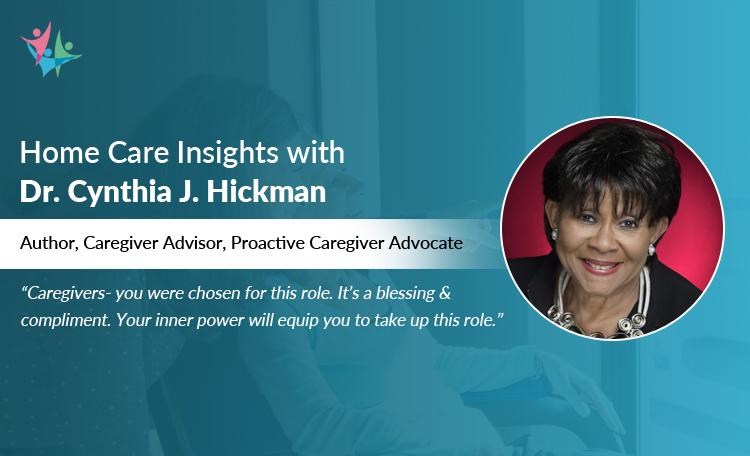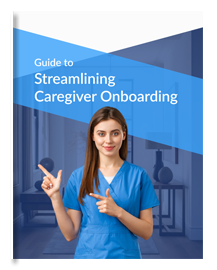In Conversation with Dr. Cynthia J. Hickman to Bring Her Insights on the Necessity of Having a Caregiver Advisor
Do you, as a caregiver, struggle to accept kind words of comfort from people who have no idea of what you’re going through as a caregiver caring for an older adult?
Well, you may think that no one truly understands what you’re going through. You may have self-doubt on yourself, sleep-defeating guilt, or pure exhaustion.
Perhaps, if you’ve just begun your journey as a caregiver, or maybe you have been in the role for an extended period; know that caregiving is a huge responsibility. Of course, it is rewarding, but it takes its toll.
Something that may help lift the burden is a community of people with the same kind of experiences- the people who laugh, care, console, or merely listen. These people are caregiver advisors or supporters who are quick to offer helpful advice, words of encouragement, and anecdotes to new caregivers.
It is wise to know advice for caregivers to put the ‘pep back in your step,’ allowing you to offer the best possible care to the elderly.
To shed some light on the same, we interviewed a home care industry expert to bring her perspective on the necessity of caregiver advice to light.

Who Did We Interview?
Dr. Cynthia J. Hickman is Your Proactive Caregiver Advocate (DBA) and author of From the Lens of Daughter, Nurse, and Caregiver: A Journey of Duty and Honor and The Black Book of Important Information for Caregivers. She is a nurse educator, caregiver advocate, and keynote speaker. Passionate storyteller about sharing caregiving tips and strategies to help other caregivers navigate challenges while celebrating daily successes.
Hickman has a Ph.D. in Health Services with a specialization in leadership and MSN with a specialization in education, both from Walden University.
Let’s get started with knowing what our expert thinks of the home care industry:
Question 1: How do you motivate your caregivers to stay strong during challenging times?
Encouraging self-care is vital in the caregiving space. We often lose ourselves in the activities of caregiving. Each morning starts with self-care. That could be a cup of a hot tea or a short walk. It could be a warm shower and reading a chapter from a favorite book in the evening. Winding down is essential!
Question 2: Share tips that can help caregivers provide quality elderly care?
Providing quality care begins with knowing the diagnosis and individualized needs of the care recipient. We never want to harm anyone because of the lack of knowledge. Ensuring needed supplies, medications, medical follow-up appointments, and a solid support system(to prevent exhaustion) are the highlights of quality care.
Remember that there must also be an awareness of social and economic factors that influence quality care. Quality care is not created equal; therefore, being intentional when caring for someone is necessary for meeting their needs, regardless of the caregiving locale.
Question 3: What advice do you offer to demotivated caregivers, and how can they prevent burnout?
The advice I would give to encourage caregivers is to know they were chosen for the role. Regardless of what it is- know it is a compliment and a blessing. Your inner power will equip you to take on the role. Know that asking for help is a superpower.
Not all caregivers do this well. Asking for help says you recognize you are human, and embracing support is caring.
Question 4: Why should caregivers be hopeful about the future of home care or senior care, especially during a caregiver shortage?
We know that seniors are the fastest-growing demographic in the nation. Caregiver shortages will diminish the more we speak about caregiver needs.
It is exciting to know state and federal legislation has been passed addressing senior care and home care. Still, each state must tap into services and options that now include technology, a key element helpful in rural health.
Robust engagement from senior and home care community leaders, who are invested in the future of caregiving, should not keep silent.
Question 5: How do you think caregivers can cope with the changing behaviors of the elderly with dementia?
The challenges of caring for loved ones with dementia require an “all hands on deck” approach.
Caregivers must understand that behavior changes are a part of the disease process and should NOT be taken seriously. This means the support system must pull together to provide needed breaks in coping with behavioral challenges. Training can be helpful for dementia care, as well.
This can be tricky because the ability to remember and process changes in faces and sometimes information can create behavioral aggression in dementia. The cognitive decline of loved ones with dementia must be handled with compassion.
When trading off caregivers, one suggestion would be to have the two sit together briefly so that the loved one can become familiar with someone taking over.
In Essence
Caregivers need help and support, too. Else they will be at risk of severe burnout. Navigating challenges can be complex, especially when you’re a new caregiver.
Our expert, Dr. Cynthia, recommends taking help from professionals like caregiver advisors and supporters who assist caregivers in providing quality care while taking care of themselves.
We hope you found this expert Q&A as insightful as we did and had something to take away from it.
